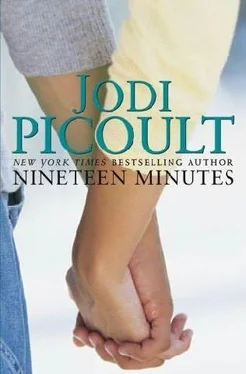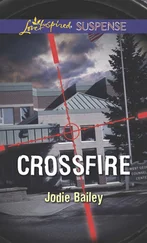She held her ear to the door, but there was no sound coming from the inside. Lacy had gone back downstairs and finished cleaning the bathroom. She had moved like a zombie through dinner, making conversation with the economist without really knowing what she was saying. Peter had not joined them. She did not see him, in fact, until the next morning, when Lacy went to wake him up and found his room already empty-and spotless. The clothes had been refolded and placed in their drawers. The bed was made. The CDs organized again, in their tower.
Peter was sitting at the kitchen table, eating a bowl of cereal, when Lacy went downstairs. He did not meet her eyes, and she did not meet his-the ground between them was still too tender for that. But she poured him a glass of juice and set it on the table. He said thank you.
They never spoke of what they’d said to each other, and Lacy had vowed to herself that no matter how frustrating it got, being the parent of a teenage boy, no matter how selfish and self-centered Peter became, she would never again let herself reach a point where she truly, viscerally hated her own son.
But as the victims of Sterling High told their stories in a courtroom just down the hall from where Lacy sat, she hoped that she wasn’t too late.
At first, Peter didn’t recognize her. The girl who was being led up the ramp by a nurse-the girl whose hair had been cropped to fit underneath bandages and whose face was twisted with scar tissue and bone that had been broken and carved away-settled herself inside the witness box in a way that reminded him of fish being introduced to a new tank. They’d swim around the perimeter gingerly, as if they knew they had to assess the dangers of this new place before they could even begin to function.
“Can you state your name for the record?” the prosecutor asked.
“Haley,” the girl said softly. “Haley Weaver.”
“Last year, you were a senior at Sterling High?”
Her mouth rounded, flattened. The pink scar that curved like the seam on a baseball over her temple grew darker, an angry red. “Yes,” she said. She closed her eyes, and a tear slid down her hollow cheek. “I was the homecoming queen.” She bent forward, rocking slightly as she cried.
Peter’s chest hurt, as if it were going to explode. He thought maybe he would just die on the spot and save everyone the trouble of going through this. He was afraid to look up, because if he did he would have to see Haley Weaver again.
Once, when he was little, he’d been playing with a Nerf football in his parents’ bedroom and he knocked over an antique perfume bottle that had belonged to his great-grandmother. It was made out of glass and it broke into pieces. His mother told him she knew it was an accident, and she’d glued it back together. She kept it on her dresser, and every time he passed by he saw the lines. For years, he’d thought that might have been worse than being punished in the first place.
“Let’s take a short recess,” Judge Wagner said, and Peter let his head sink down to the defense table, a weight too heavy to bear.
The witnesses were sequestered by side, prosecution in one room and defense in another. The policemen had their own room, too. Witnesses were not supposed to see each other, but nobody really noticed if you left to go to the cafeteria to get a cup of coffee or a donut, and Josie had taken to leaving for hours at a time. It was there that she’d run into Haley, who’d been drinking orange juice through a straw. Brady was with her, holding the cup so she could reach it.
They’d been happy to see Josie, but she was glad when they left. It hurt, physically, to have to smile at Haley and pretend that you weren’t staring at the pits and gullies of her face. She’d told Josie that she had already had three operations with a plastic surgeon in New York City who had donated his services.
Brady never let go of her hand; sometimes he ran his fingers through her hair. It made Josie want to cry, because she knew that when he looked at Haley, he was still able to see her in a way that no one else would again.
There were others there, too, that Josie hadn’t seen since the shooting. Teachers, like Ms. Ritolli and Coach Spears, who came over to say hello. The DJ who ran the radio station at the school, the honors student with the really bad acne. They all cycled through the cafeteria while she sat and nursed a cup of coffee.
She glanced up when Drew flung himself into a chair across from her. “How come you’re not in the room with the rest of us?”
“I’m on the defense’s list.” Or, as she was sure everyone in the other room thought of it, the traitors’ side.
“Oh,” Drew said, as if he understood, although Josie was sure he didn’t. “You ready for this?”
“I don’t have to be ready. They’re not actually going to call me.”
“Then why are you here?”
Before she could answer, Drew waved, and then she realized John Eberhard had arrived. “Dude,” Drew said, and John headed toward them. He walked with a limp, she noticed, but he was walking. He leaned down to high-five Drew and when he did, Josie could see the pucker in his scalp where the bullet had entered his head.
“Where have you been?” Drew asked, making room for John to sit down beside him. “I thought I’d see you around this summer, for sure.”
He nodded at them. “I’m…John.”
Drew’s smile faded like paint.
“This…is…”
“This is fucking unbelievable,” Drew murmured.
“He can hear you,” Josie snapped, and she crouched down in front of John. “Hi, John. I’m Josie.”
“Jooooz.”
“Right. Josie.”
“I’m…John,” he said.
John Eberhard had played goalie on the all-star state hockey team since his freshman year. Whenever the team won, the coach had always credited John’s reflexes.
“Shoooo,” he said, and he shuffled his foot.
Josie looked down at the undone Velcro strap of John’s sneaker. “There you go,” she said, fixing it for him.
Suddenly she could not stand being here, seeing this. “I’ve got to get back,” Josie said, standing up. As she walked away, blindly turning the corner, she crashed into someone. “Sorry,” she murmured, and then heard Patrick’s voice.
“Josie? You all right?”
She shrugged, and then she shook her head.
“That makes two of us.”
Patrick was holding a cup of coffee and a donut. “I know,” he said. “I’m a walking cliché. You want it?” He held the pastry out to her, and she took it, even though she wasn’t hungry. “You coming or going?”
“Coming,” she lied, before she even realized she was doing it.
“Then keep me company for a few minutes.” He led her to a table across the room from Drew and John; she could feel them looking at her, wondering why she might be hanging out with a cop. “I hate the waiting part,” Patrick said.
“At least you’re not nervous about testifying.”
“Sure I am.”
“Don’t you do this all the time?”
Patrick nodded. “But that doesn’t make it any easier to get up in front of a room full of people. I don’t know how your mom does it.”
“So what do you do to get over the stage fright? Imagine the judge in his underwear?”
“Well, not this judge,” Patrick said, and then, realizing what he’d just implied, he blushed deep red.
“That’s probably a good thing,” Josie said.
Patrick reached for the donut and took a bite, then handed it back to her. “I just try to tell myself, when I get out there, that I can’t get into trouble telling the truth. Then I let Diana do all the work.” He took a sip of his coffee. “You need anything? A drink? More food?”
“I’m okay.”
“Then I’ll walk you back. Come on.”
Читать дальше












